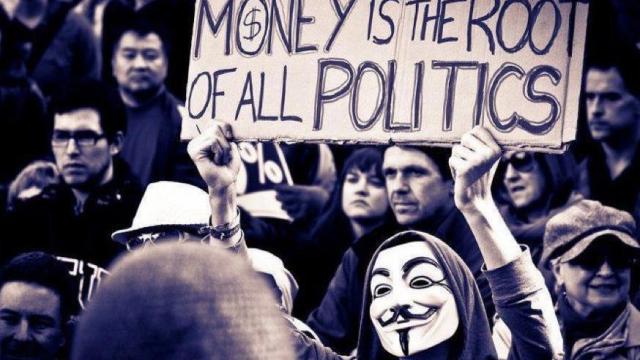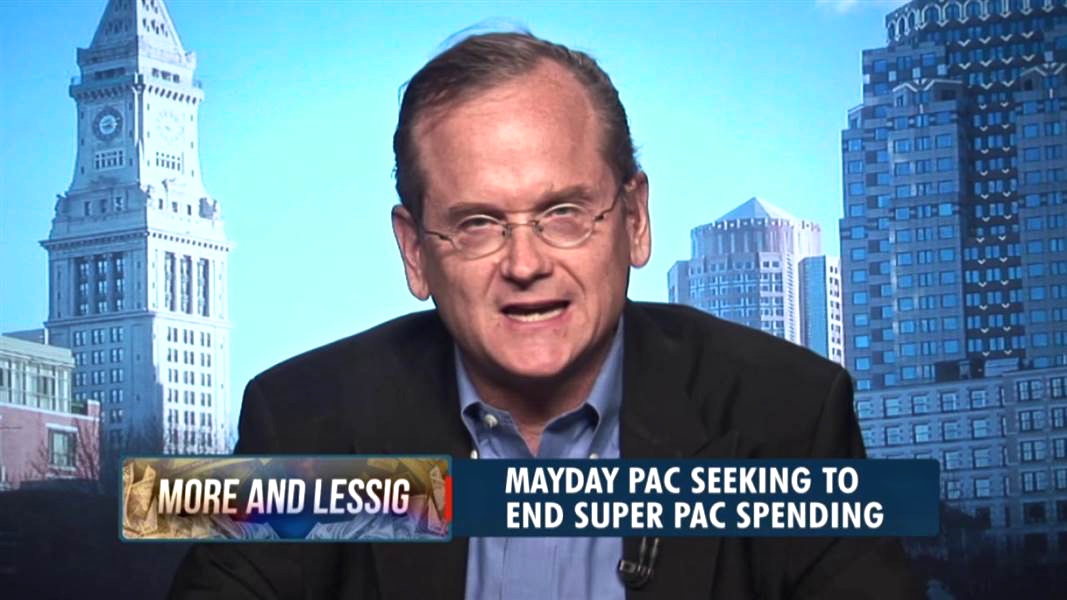
While Lawrence Lessig concedes he is an “egghead,” he refuses to agree that the corrupting influence of money in politics is a “zero issue.”
Lessig quotes a Politico article in a video and written data report entitled “How to waste $10 million,” which came out on Nov. 6, two days after the congressional elections. The article effectively calls Lessig's experiment with the MayDay PAC a failure and borrows the endearing term of "egghead" from another reform advocate who worked with Lessig in the past – before the launch of his "super PAC to end all super PACs."
“'The last thing that the progressive movement needs is another ivory tower egghead trying to play political operative and sucking up valuable donations and resources for his personal vanity project," it reads. "For the sake of reforming money in politics, I wish Larry Lessig would please stop.'”
But Lessig has no intention of stopping. Indeed, the loss of six out of eight MayDay supported races has Lessig more inspired than deflated. As the data proves, the loss in no way indicates a populace disinterested in money in politics.
What the Data Tell Us
On Dec. 9, MayDay released a full data report of the MayDay PAC's 2014 election results, as well as a video from Lessig introducing the data, discussing the lessons learned and charting the path forward.
It is a complete and [detailed scientific release](data only: https://www.dropbox.com/s/2au8gklcypyrdd0/2014.12.09%20Mayday.US%20Repor...), including numbers such as:
- 67,547 donations paid for TV ads, digital ads, radio and over 700,000 pieces of mail.
- Over 800 volunteers achieved more than 25,000 door knocks.
- Over 555,000 phone calls were placed on or before election day.
The results were also, as Lessig puts it, “an invitation” to not only look at the data but to join the movement.
“I hope these data encourage more campaigns to take up the issue,” he writes. “They have taught us a great deal about how to push this issue in the future.”
The 60-page report is straightforward and self-critical, including all the facts and information as the group was authorized to release (some of its partners didn't grant permission to publish their data publicly). It offered a kind of transparency unlike what we're used to seeing in politics.
Lessig serves up another morsel not often seen in the political realm: admission of defeat accompanied by an honest analysis of the loss.
“Our bet was that if we prevailed despite the odds, it would be easier to convince the skeptics that this issue mattered to voters... we lost that bet,” he says.
It was a big bet to make. MayDay chose races where the odds of winning were low – a pushback against skeptics who claimed that past reform victories had more to do with progressive districts than the importance of money in politics for voters.
As Lessig explains, the knee jerk reaction to anything associated with President Obama caused a windfall of Democrat losses:
“Five of the defeated candidates were Democrats. The sixth, Greg Orman of Kansas, though an Independent, was effectively painted as a Democrat by his Republican opponent. The partisan wave against the President in this election cycle was enormous, and rose even higher in the last days before the election. Vulnerable Democrats across the board were defeated. It's therefore no surprise that our bets in difficult races would fail as well.”
Lessig doesn't offer this explanation as an excuse but as yet another piece of important data to consider. Admitting failure is one thing, admitting defeat another. And the data doesn't suggest defeat. In fact, it proves that not only is the role of money in polices more than a “zero issue” – it's an issue rapidly growing in concern among voters across the political spectrum.
“Across the board, we found the corrupting influence of money to be among the most important of the most important issues that people voted on,” Lessig says in the video.
“In six out of eight races, it was on par with protecting social security and medicare. In all races but one, Congressmen putting their own self interest above the district's interest was the most important issue. In six out of eight races, we increased the salience of corruption as an issue and among those who picked corruption as the most important issue, our candidates always enjoyed a double-digit lead,” he says.
“If ours is a zero issue, then every issue is a zero issue, too,” he concludes.
A Popular Issue
This last comment is true not only in regards to the data the report offered, but in the sense that money in politics is increasingly recognized as the central issue from which all other issues stem from. As more and more people understand the crisis, it's become clear that without first fixing this issue we cannot focus on any other, more particular issues because monied interests will block our way at every turn.
That said, many organizations found – and the MayDay data seems to support – that drawing a connection between the abstract issue of money in politics and other, more tangible policy issues is a good thing.
“When this issue is tied to other issues, the corrupting influence of money becomes a powerful force within an election,” Lessig writes. And in the video he likewise states: “When we can add our issue to other issues such as healthcare and climate change, people respond to those issues much more and they vote differently.”
This is not only good news for people fighting the influence of money in politics, but for all the issues that we, as activists, tie to that influence. Looking further through the data, it becomes clear that while skeptics and corporate cronies may be chuckling now, popular interest in the corruption issue is spreading – and it's particularly inspiring to see it spread in races where the odds of winning on a reform ticket were very low.
For example, in all of the races where MayDay PAC got involved, at least 10% of voters “said that the influence of big-money campaign donors on our democracy was their most important voting issue.”
Of that 10%, 50% were Democrats and 50% were Republican or Independent.
Data also shows that the ads put out by MayDay, considered too academic by some critics, actually turned out to be quite persuasive. “At least 20% of voters said they were 'much more likely' to vote for our candidate after seeing our ads. Among issue voters across all races, this number averaged 47%,” says the report.
Furthermore, “among people concerned about the corrupting influence of special interests, in all races except one our candidates enjoyed a double digit lead.”
Now, the MayDay plan moving forward, while originally slated to focus on the 2016 elections, will not wait because, as Lessig says, it cannot.
“We must begin this work now. The real hunger in our community is to find a different way to make progress on this issue, one that relies less on 30 second television ads and less on vilifying the other side,” he says, critiquing his own MayDay efforts.
Corruption is not a left or right issue, he continues, as members of Congress from both sides of the aisle, both Republican and Democrat, are fed up with systemic corruption and monied interests poisoning our democracy.
While Lessig doesn't reveal specific actions planned for the coming year, he hints at a new platform that will call on MayDay followers “to help recruit members of Congress to support reform.” Instead of asking for money, Lessig is now asking for time, and just a little bit of it. What's most clear is that success will be contingent on the involvement of the people.
“If we build it, they will come,” he says. “That's the thing about our leaders, they are always looking for enough of us to follow. I am now more convinced, more than ever, that our cause is not only just, but possible.”
Lessig has championed this view in his various reform projects, from New Hampshire Rebellion to his interviews and TED talks. The only thing standing in his way, he says, is the thing that's standing in the way of all of us: ourselves. This is especially true of young people who didn't weigh in with serious numbers in the November polls.
MayDay data shows that the majority of people who responded “most strongly to our ads...were mostly middle-aged” and that the “10% of voters who hold reducing big donor influence as their most important issue are disproportionately men aged 65+.” Races in Arizona (District 7), Iowa (District 3) and New Hampshire (Senate race) “show that millennials and adults 45-65 can also be mobilized.”
“Can be mobilized” isn't good enough, however. It's time to put talk into action. As Kevin Zeese writes, “2015 is the year to escalate... people need to unite and recognize we are one movement of movements. People mobilizing can build their power and shape the future.”
Skeptics and critics of MayDay PAC, and of the Get Money Out movement in general, will continue to berate these efforts as “zero issues” – insignificant ventures of the overly academic or ignorantly optimistic. They will continue just as corruption will continue: until we make it stop.
For more information and to get involved in the nationwide campaign to get money out of politics, go here.
3 WAYS TO SHOW YOUR SUPPORT
- Log in to post comments














